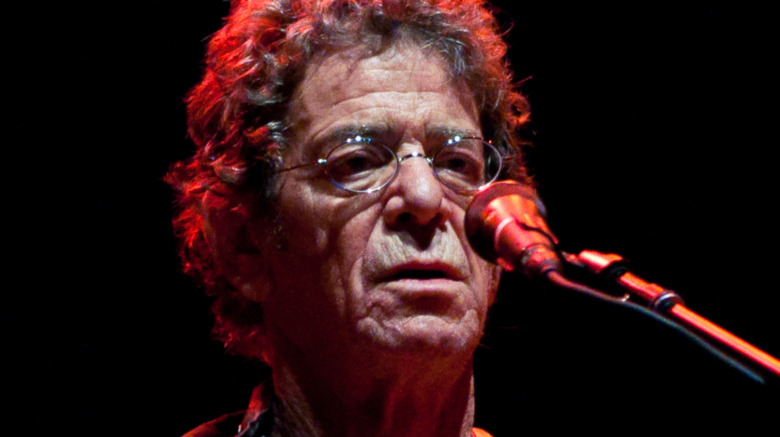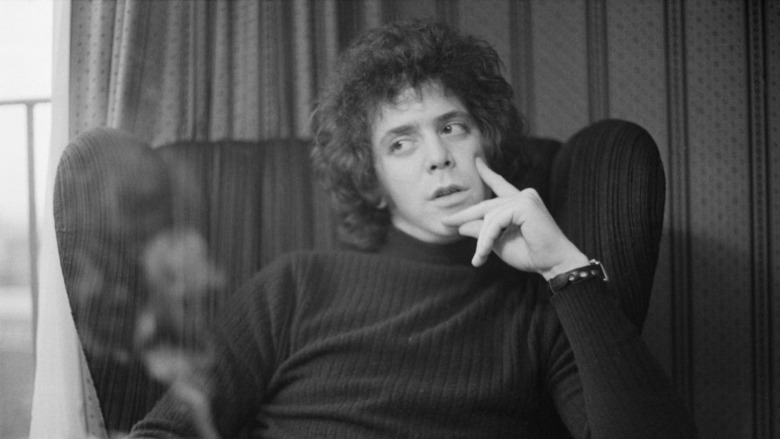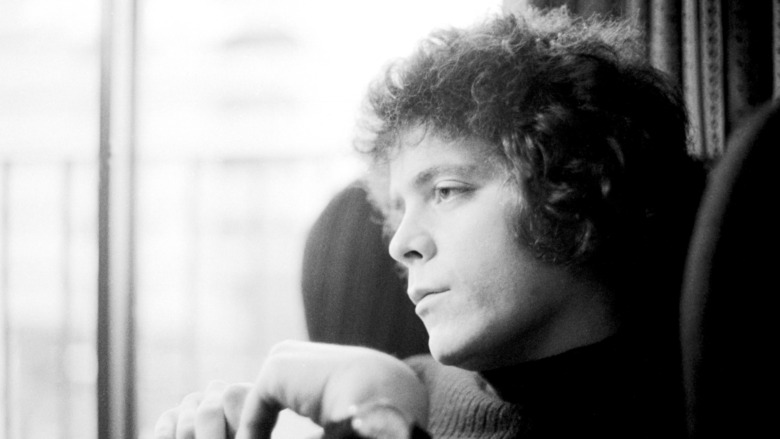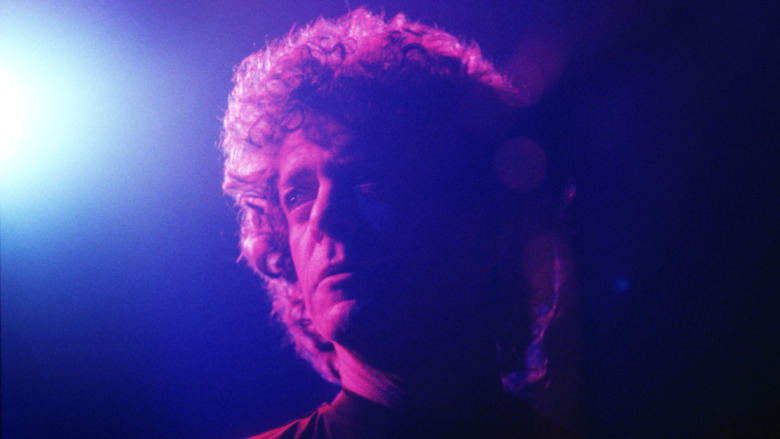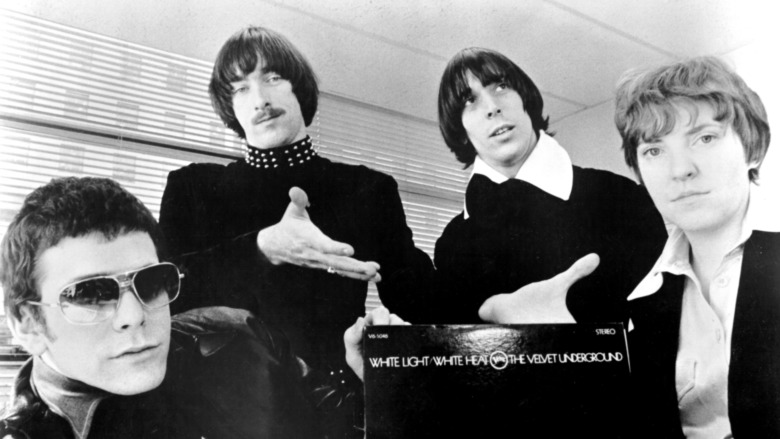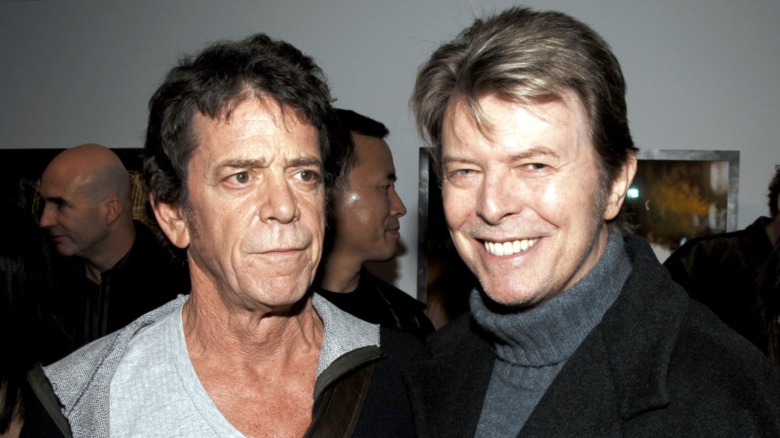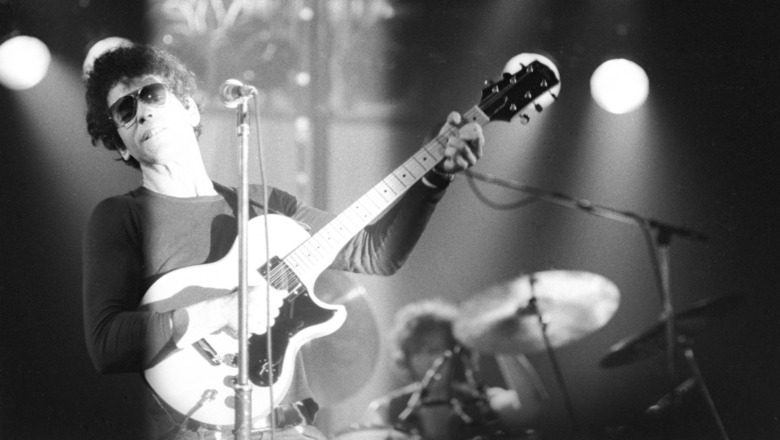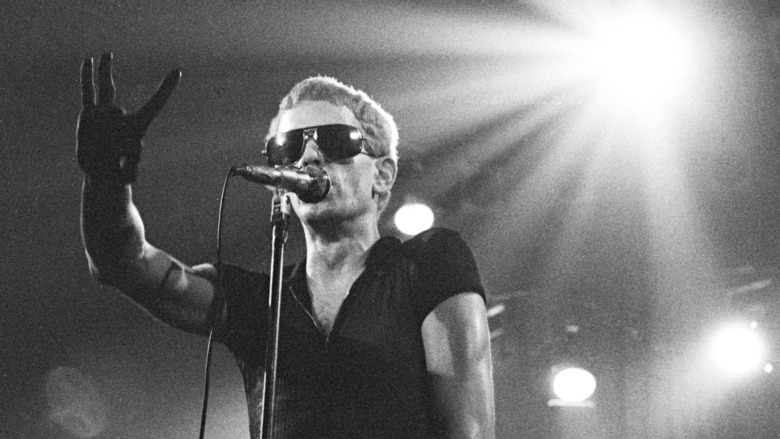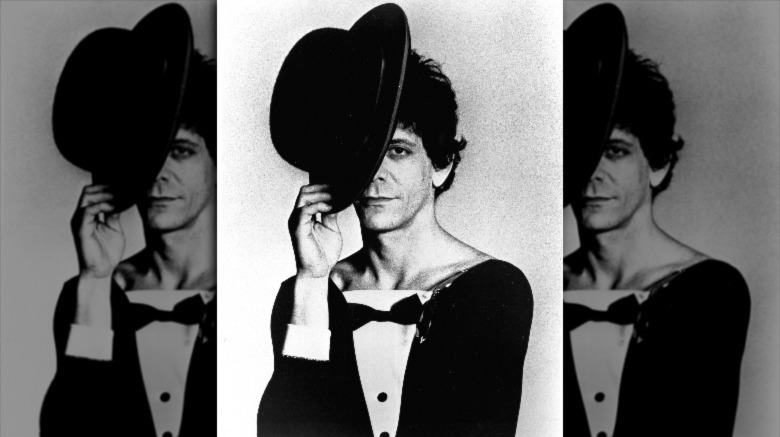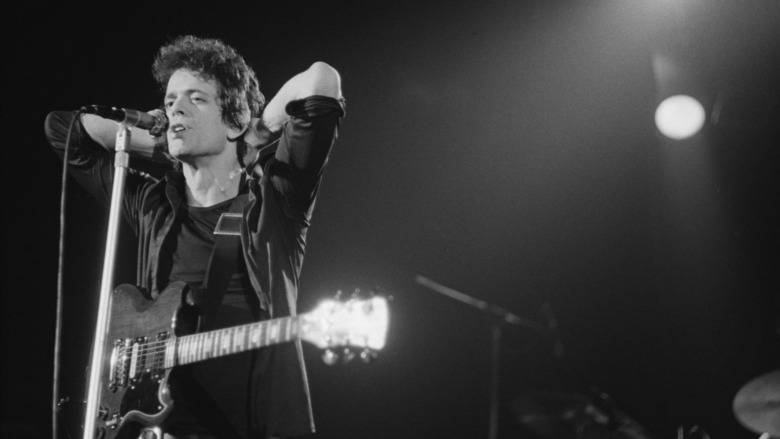The Untold Truth Of Lou Reed
Few performers can match the pervasive influence of Lou Reed, whose spell as leader of The Velvet Underground and prolific career as a solo artist went on to inspire scores of the world's best loved musicians. In a recent interview with The Guardian, Mick Rock — the photographer who shot the famous portrait of Reed adorning his most enduring solo album, 1972's "Transformer" — claimed that the underground scene of the early seventies that created a melting pot of talent and brought Lou Reed together with such luminaries as David Bowie and Iggy Pop could never exist again ... and that there could never be another Lou Reed: "There is none of that time to play together and influence each other today because of the internet. Anything can go viral now and become successful immediately."
Immediate success certainly eluded the now-iconic Lou Reed, or appeared to be doing so at the time. The young songwriter had already released songs of his own prior to moving to New York to study at Syracuse University in the early 1960s but made little impact — a state of affairs that would continue, despite his productivity, throughout the decade. However, the music of The Velvet Underground is hailed as some of the most important avant-garde achievements of the era.
Today, Reed's creative life is looked back upon as one of the towering musical accomplishments of the century, yet nearly a decade after his death he remains a mysterious, mythic figure.
Lou Reed's conventional beginnings
Lou Reed's early years belie the musical experimentation that would come to define his work in the late 1960s. Like many of the greats, Reed started young. His first record, released as a member of a group called The Jades, came out when Reed was just 14-years-old, according to The Guardian. The song, a conventional doo-wop number titled "So Blue," was written by Reed himself, though on the record the young songwriter takes a backseat, adding backing vocals and a smattering of rhythm guitar. As tame as the song sounds today, "So Blue" gives an indication of the influences Reed was working under: as well as rhythm and blues, Reed was a keen fan of jazz, and delved into the avant-garde free jazz explosion of the previous decade, as The Guardian notes.
At Syracuse, Reed began hosting his own college radio show, "Excursions on a Wobbly Rail," which, as well as the more palatable R&B numbers that informed his very first songs, exposed student listeners to a wide range of oddball jazz tunes that would continue to inspire Reed's songwriting throughout the late 1960s.
Lou Reed's 'ostrich guitar' showed his avant-garde sensibilities
Reed's first job after graduating in 1964 was at a songwriting "factory" known as Pickwick City Records. According to Rolling Stone, the company made their money churning out low-budget imitations of pop music fads and trends, relying on the imitative skills of writers and performers like Reed to piggyback on current hits. "They would put us in a room and say, 'Write 10 California songs, 10 Detroit songs,'" Reed later recalled, per the same source.
One of Reed's early projects was a parody dance craze song called "The Ostrich," released under the band name The Primitives. The lyrics sketch impossible dance moves — such as "take a step forward and step on your head" — while further silliness is added by Reed's guitar tuning, with all strings tuned to E, creating a droning, garage-y sound. According to Genius, this tuning caught the attention of John Cale, a classical musician who had been brought in to perform the song live — which the record label believed might actually become a hit, per Rolling Stone — and who, impressed by Reed's experimentation, began to collaborate with the young songwriter.
The "Ostrich guitar" — Reed's name for his one-note tuning style — would go on to become what Stereogum calls the "secret weapon" of The Velvet Underground, the group Reed would later form with Cale and through which he would achieve his first taste of critical acclaim.
Lou Reed was subjected to electroshock therapy
"When all is said and done, there was no reason for Lou not to graduate. He went to class and he was very smart," said Reed's friend Richard Mishkin, per Rolling Stone. Similarly, it is tempting to imagine that Reed's undeniable talent meant that achieving musical success was an inevitability — that, in a word, he had it easy. But by merely scratching the surface of his early life, we can see that Reed had much to contend with in terms of both his mental health and how his problems were dealt with using the treatments of the day.
Following Reed's death in 2013, many obituaries, including that in The Guardian, noted that Reed had been treated from the age of 11 with electroconvulsive therapy, a brutal procedure intended to alter the patient's brain chemistry which, per the Mayo Clinic, was originally performed without anesthetic. The New York Times describes how the therapy left Reed with a feeling of "incredible rage" towards his parents, who had reportedly sought treatment to combat Reed's adolescent anxiety, antisocial behavior, and, possibly, homosexual urges (though Reed's sister later denied this, per the same source).
The picture that emerges, in any case, is of Reed as a tortured youth, who, suffering mental health issues and the trauma of his treatment, turned to drugs at an early age; NME reports that, alongside marijuana and LSD, Reed began injecting heroin while still at university.
Lou Reed had to move home to make his breakthrough
"Heroin," a song detailing Lou Reed's experiences of using the drug, became a cornerstone of The Velvet Underground's early repertoire. The group — originally consisting of Reed, John Cale, guitarist Sterling Morrison, and drummer Angus MacLise, who was soon replaced by Moe Tucker, according to All Music – gained a modest but well-connected audience with their avant-garde and taboo-breaking take on rock 'n' roll, which also brought them to the attention of Andy Warhol. Warhol went on to produce their debut album, 1967's "The Velvet Underground & Nico," for which Warhol convinced Reed to incorporate as a co-vocalist a German chanteuse, Nico, according to udiscovermusic. The same source notes, however, how, despite their artistic successes, the music of The Velvet Underground failed to chime with the trends of the day. 1967 was the year of the Summer of Love, and as groundbreaking as his early music is considered today, in the hippie era Reed's artsy band failed to make any commercial breakthrough. Their fourth album, 1970's "Loaded," was an attempt to "load" an album with potential hits, but it still failed to sell, and Reed left the group shortly after, per Ultimate Classic Rock.
Finding himself in a creative nadir, Reed returned to live with his parents in Fairport, Long Island, where he took a job as a typist at his father's accountancy firm, according to The Independent. However, Reed's hiatus from music would not last long.
Lou Reed's prestigious friendships
"It was like his life was over," says Lou Reed's friend from the Warhol scene, the writer Glenn O'Brien, according to The Independent. That the shock-rocker and New York music scene darling had effectively retired from his hard-partying life and found solace in suburbia with his parents was a source of deep embarrassment, for Reed himself but also for many of the flighty and fickle friends he had met in New York. Reed delved deeper into conventional poetry, vowing, per the same source, never to play rock 'n' roll again.
However, despite Reed's disappointment with the final Velvet Underground release, "Loaded" saw rising British rockstar David Bowie "beating a path to [Reed's] door," as The Independent puts it. Reed finally returned to music in 1971, when he signed a deal with RCA records as a solo artist, according to All Music. And just as Andy Warhol had helped to shape The Velvet Underground, in the early 70s Reed's friendship with Bowie saw his solo career — after a disappointing debut album — hit its creative peak with the Bowie-produced 1972 album "Transformer," featuring Reed's most famous songs: "Walk On The Wild Side" and "Perfect Day." Bowie would remain a friend and admirer of Reed throughout his life.
When Lou Reed died in 2013, Bowie led the tributes to his former collaborator. "He was a master," said Bowie, per the BBC.
Lou Reed's strange relationship with his Jewish heritage
Lou Reed was a notoriously evasive interviewee. "I've lied so much about the past I can't even tell myself what is true anymore," Reed told Uncut in 2003, in a typically combative exchange. Many of Reed's friends and acquaintances have recalled the singer's instinctive desire to shock. Per Rolling Stone, John Cale once recalled that Reed "enjoyed taking situations to extremes you couldn't imagine until you'd been there with him. He would befriend a drunk in a bar and, after drawing him out with friendly conversation, suddenly ask, 'Would you like to f*** your mother?' I thought I was reckless, but I'd stop at goading a drunk. That's where Lou would start."
Reed's subversive impulses were also turned on his own heritage. As reported by HuffPost, Reed was "known to make the occasional antisemitic remark," despite being Jewish himself. In an interview with Lester Bangs, Reed also claimed to have no Jewish friends, even though his friendship with Jewish poet Delmore Schwartz was well documented. Yet in another interview, Reed claimed that "all the best people" are Jewish, per The Times of Israel, and ignored calls for performers to boycott Israel, continuing to perform there until 2008.
Reed was not conventionally religious. "My God is rock 'n' roll. It's an obscure power that can change your life. The most important part of my religion is to play guitar," Reed once said, per The Times of Israel.
Metal Machine Music nearly wrecked Lou Reed's career
With the help of David Bowie, "Transformer" was an international hit which rode the glam rock wave of the early seventies while showcasing Reed's idiosyncratic songwriting. The album lived up to its name by altering Reed's career and sending him into the rock 'n' roll stratosphere overnight.
But, in a turn of events that would become the usual mode throughout Reed's patchwork career, the unadulterated acclaim was not to last. Ever looking to experiment, Reed followed "Transformer" with 1973's "Berlin," a double album chronicling the dissolution of a marriage (Reed's own marriage was also breaking apart at the time, per The Guardian). The bleak record was a commercial flop, though, per Pitchfork, Reed's audience returned for his highly successful live album, 1974's "Rock 'n' Roll Animal," and a follow-up studio album "Sally Can't Dance."
However, 1975's "Metal Machine Music," a sprawling double album of noise and distortion — with no actual songs or any vocals, as noted by the BBC – was received so badly that many assumed it was a joke. Rumors circulated that the album had been made so Reed could get out of his recording contract, or that it was intended as a direct attack on his fans. However, as Pitchfork notes, "Metal Machine Music" serves as a "logical endpoint" of the drone music that he began experimenting with using the ostrich guitar. "The truth is that I really, really, really loved it," Reed told Pitchfork in 2007.
Lou Reed was open about his sexuality
Reed's first marriage, to Bettye Kronstad in 1973, lasted less than a year before it ended in divorce, according to The Independent. Kronstad, who was with Reed as his career took off, later said that fame turned Reed into a "monster," per the same source. However, in the same piece Reed's first wife explains the importance of Reed to his fans, and of his songs like "Walk On the Wild Side," one of very first songs to describe queer experiences. "Before Lewis, the LGBT community were oppressed and completely disenfranchised. He gave a voice to them," Kronstad wrote.
Just as in his music, in both his habits and his relationships Reed was fiercely pushing back the bounds of acceptability, often with admirable fearlessness — his openness about his own sexuality, for example, was out of step with the intolerances of the day. As noted by The New York Times, Reed publicly identified as gay throughout the '70s, despite having married a woman. The most publicized of his relationships during this time was with Rachel Humphreys, a transgender woman who, per Vice, inspired much of Reed's work in the final years of the decade, especially on the 1975 album "Coney Island Baby."
However, Reed was also frustrated by what he saw as the commodification of non-heterosexuality in the music industry, per an interview with critic Lester Bangs via The Guardian, and, later, distanced himself from his former queer identity.
Lou Reed's ill-fated Metallica collaboration is having a revival
Though "Metal Machine Music" represented such a critical and commercial nadir at the time of its release that many believed it capable of destroying Lou Reed's entire career, the singer, who had already been through numerous disappointments, managed once more to find himself an audience. Beginning his recovery with "Coney Island Baby" later in 1975, Reed continued to release music prolifically, finding his commercial heights in 1989 with the album "New York," Reed's only certified gold record, according to Pitchfork. Per the same source, what characterizes Reed's career throughout his life is the unpredictability of his releases; just as the popular hit "Transformer" was followed by the high-concept bomb "Berlin," Reed worked with no sense that he should ever fulfil the expectations of either fans or critics.
And nothing demonstrated this aspect of Reed's personality more than his final album, 2011's "Lulu," a collaboration with heavy metal outfit Metallica. Per the NME, "Lulu" has become known as "one of the worst reviewed albums ever," with contemporary music critics railing against the perceived mismatch of Reed's woozy and subtle narrative lyrics with Metallica's sledgehammer instrumentation.
However, as with seemingly all of Reed's output, years after his death "Lulu" has received some positive reappraisal, with Louder, in an article titled "In defense of Lulu," describing Reed's final project as "misunderstood."
Lou Reed was comforted by Tai Chi at the time of his death
Lou Reed died from complications of liver cancer on October 27, 2013, aged 71. He had been diabetic for many years and also suffered from hepatitis, an illness he first contracted in the early days of his drug use, per The Spinoff, and as reported in The Guardian Reed had undergone a liver transplant in the months prior to his death.
In his youth, Reed's drinking and drug-taking was notoriously excessive, but the singer began making steps to get clean as early as 1979, per The New York Times, and developed a deep love for Eastern philosophy and tai chi, a martial art that he continued to practice throughout his life. Following Reed's death, his wife Laurie Anderson described her husband's final hours (per The Guardian): "Lou was a tai chi master and spent his last days here being happy and dazzled by the beauty and power and softness of nature. He died on Sunday morning looking at the trees and doing the famous 21 form of tai chi with just his musician hands moving through the air."
Anderson explained that Reed had a peaceful death, and described her late husband as a "prince and a fighter."
Lou Reed remembered: a hero and a 'monster'
Lou Reed's death sparked an outpouring of effusive tributes from his many collaborators, friends, and admirers, with fellow Velvet Underground founder John Cale saying (per The Guardian): "The world has lost a fine songwriter and poet ... I've lost my school-yard buddy," while fans such as Ricky Gervais took to social media to express the impact Reed had on their lives, with the music journalist Charles Shaar Murray claiming that Reed "completely changed the cultural landscape we inhabit," per the BBC.
However, Murray also added that Reed "was not considered a likeable man, except by his closest friends," and, in the years following his death, accounts of his abusive behavior and difficult personality have been hard to ignore. According to The New York Times, a 2015 book by Howard Sounes pulled no punches in its portrayal of Reed as an aggressive and abusive artist, who freely used racial slurs and violence throughout his career.
But while scrutiny of Reed has increased as the portrait of the man has grown clearer, his artistic achievements and lasting influence have never been in doubt. As Bill Wyman stated in a piece for Vulture: "For better or worse, Lou Reed was always Lou Reed: a self-sabotaging, widely disliked man who gave voice to the unwanted and despised."
